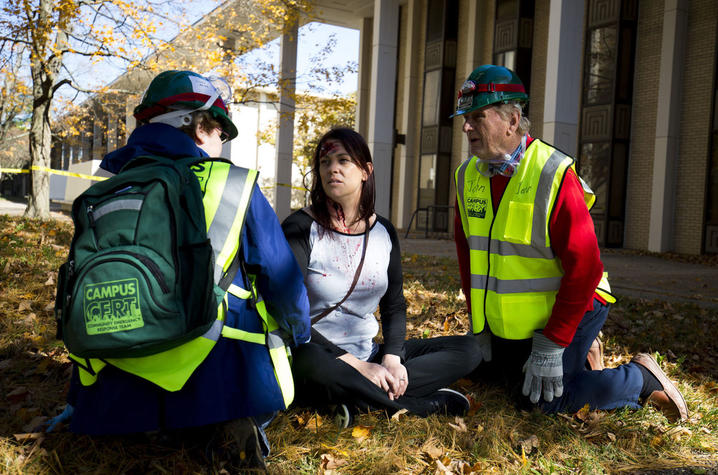Campus Emergency Response Team Celebrates 6th Year, Registration Open for Fall 2019 Training

LEXINGTON, Ky. (Sept. 19, 2019) — As natural disasters can bring costly and deadly impacts to our communities, the capability of deploying thousands of trained civilians can ease the pressure on first responder professionals during the chaos of a disaster like an earthquake, wildfire, flood or tornado. The University of Kentucky Police Department recognized the need for a Campus Community Emergency Response Team (C-CERT) and launched its first training for UK faculty and staff in 2014, joining CERT programs that have grown from a handful to about 2,800 nationwide over the past 25 years.
Beginning Wednesday, Oct. 9, C-CERT training will be held from 8:30 a.m. to 4:30 p.m. each Wednesday for five weeks in The 90 and end with a mock disaster exercise Wednesday, Nov. 6. This is the sixth consecutive year UKPD’s Division of Crisis Management and Preparedness has offered C-CERT training, applying an established curriculum from the U.S. Department of Homeland Security with added modules, such as utility safety, that are applicable to the university environment.
C-CERT volunteers are intended to serve as “multipliers” in emergency response — not substitutes for the services delivered by professional first responders, said UK Police Chief Joe Monroe. “The complexity of UK's critical infrastructure and the tens of thousands of visitors for special events underscores the need to educate employees about disaster preparedness for hazards that may impact campus and its vital resources,” Monroe said.
C-CERT volunteers receive basic training on disaster preparedness, fire safety and suppression, first aid and medical triage, light search and rescue, and disaster psychology and terrorism.
Basic first aid includes treating burns, sprains, broken bones, wounds and other common injuries during emergencies. Medical triage requires volunteers to quickly assess the injuries of victims and determine who has the most urgent need for care. The medical triage portion of the curriculum, for example, teaches volunteers to employ a universal system used by emergency professionals that involves tagging victims with different levels of injuries using green, yellow, red and black tags.
Volunteers are also taught how to mark buildings during search and rescue operations, communicating information about the search, such as the time, date, areas searched and locations of victims.
The basic CERT curriculum is meant to ensure volunteer teams from different geographic areas can work cohesively, and the handoff to professional emergency responders goes smoothly.
Over 100 faculty and staff members across campus have gone through training. Using the training learned in the classroom and during exercises, C-CERT members can assist others in their neighborhood or workplace following an event when professional responders are not immediately available to help.
Registration for the 2019 training is open now through Oct. 4. Class size is limited, and enrollment is on a first-come, first-served basis. The training is free and open to regular full-time faculty and staff. To register, please click here.
UK faculty and staff who want to participate in the C-CERT training this fall will be expected to obtain approval from their supervisor to attend 40 hours of training and submit to an electronic background check. Refresher trainings on a variety of topics are planned each year for UK C-CERT members along with opportunities to utilize these skills in responding to campus events or emergencies.
To find out more, visit UKPD’s C-CERT website, UKPD Facebook page, or contact Laurel Wood by calling 859-257-6655 or by email at laurel.wood@uky.edu.




